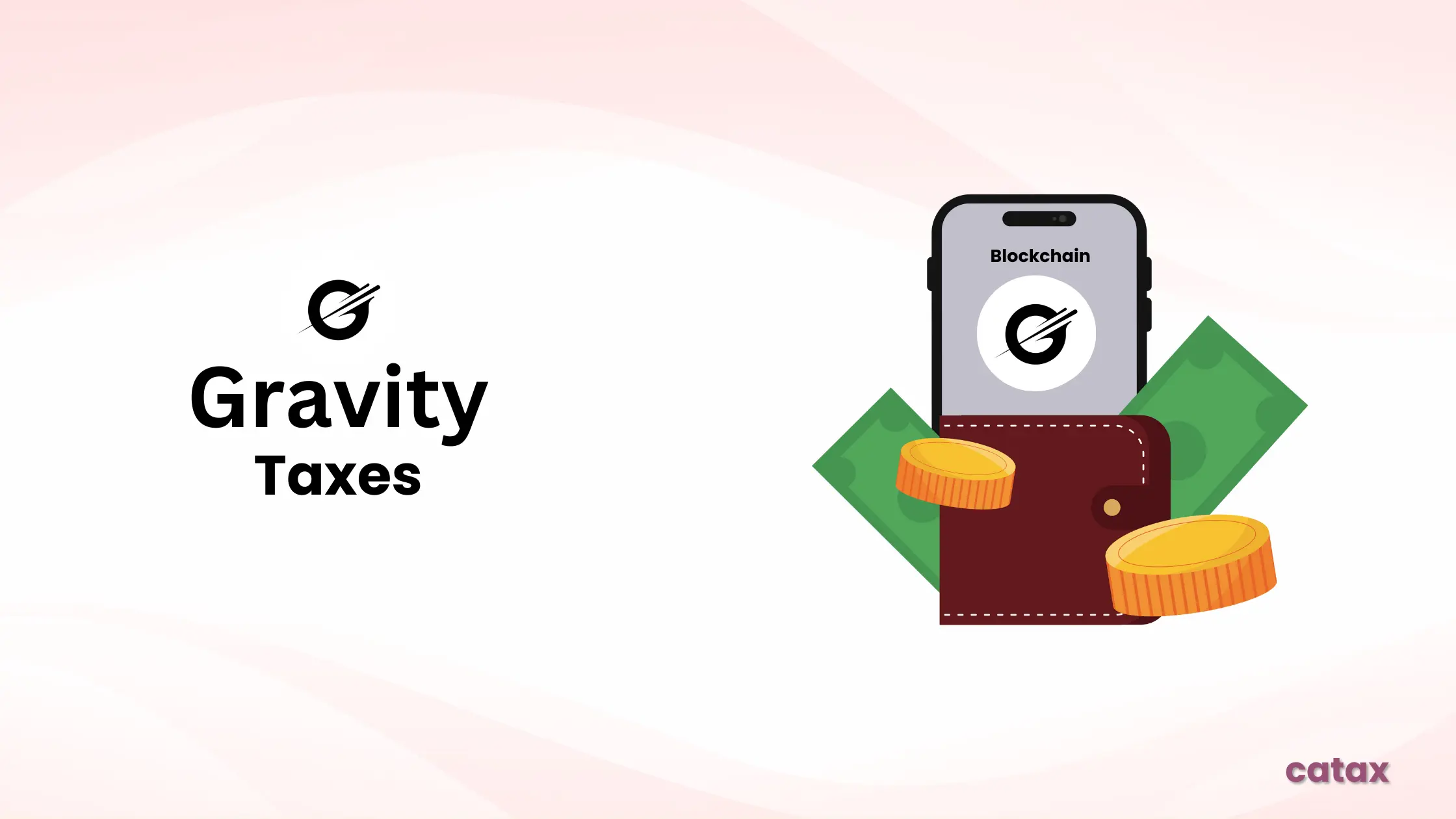Cryptocurrency tax rules differ from country to country, and Gravity (GRV) transactions may be subject to taxation based on local laws. If you buy, sell, trade, or stake GRV, it’s important to understand how tax authorities classify these activities and what taxes you might owe.
This guide explains Gravity tax rules in simple words to help you follow the law and manage your taxes easily.

How to Connect Your Gravity Wallet to Catax
You can track your Gravity (GRV) transactions and calculate taxes more easily by connecting your wallet to Catax. Here’s how:
- Open your Gravity wallet or use a block explorer (such as MetaMask, Trust Wallet, Ledger, or any supported wallet).
- Copy your public wallet address.
- On Catax:
- Log in and select your country.
- Select Chain, then search for Gravity Wallet.
- Paste your wallet address and click Connect.
After connecting, Catax will automatically keep track of your GRV transactions and help you calculate taxes.
Calculate My Taxes ➤Are Gravity (GRV) Transactions Taxable?
Yes, in most countries, Gravity transactions are taxable. Governments see GRV as property, income, or a capital asset, depending on how you use it.
When Do You Have to Pay Taxes on Gravity?
You may owe taxes when you:
- Sell GRV for a profit – If you sell Gravity for more than you paid, you may owe capital gains tax.
- Trade GRV for other cryptocurrencies – Exchanging Gravity for Bitcoin, Ethereum, or other cryptos can be a taxable event.
- Use GRV for purchases – Spending Gravity when its value has risen since you bought it can trigger capital gains tax.
- Earn GRV from staking – Many countries tax staking rewards as income when you receive them.
- Receive GRV as payment – Getting paid in Gravity for work or services usually counts as taxable income based on its market value at the time.
Because tax laws vary by country, check how your local tax authority treats Gravity transactions to avoid issues.
Can You Deduct Trading Fees and Other Costs?
Many Gravity users wonder if they can deduct fees from their taxable income. The answer depends on your country’s tax rules.
Some countries allow deductions for:
- Trading fees when buying or selling GRV.
- Transaction fees paid when moving GRV between wallets.
- Security costs, like hardware wallets or private key management.
Other countries only allow deductions for:
- The original purchase price of Gravity, but not additional fees like exchange or transfer costs.
Check your local tax rules carefully to know what you can deduct.
How Is Gravity (GRV) Taxed Based on Holding Period?
The tax rate on profits from Gravity may depend on how long you hold the tokens before selling:
- Short-term holdings (less than a year) – Usually taxed at higher rates, like regular income.
- Long-term holdings (more than a year) – Some countries offer lower tax rates to encourage holding crypto longer.
- Flat tax rates – Some places tax all crypto profits the same, no matter how long you held them.
Knowing your country’s tax system helps you plan and reduce taxes when possible.
You can also check out our Country-Specific Guide for Crypto in Your country. This guide provides insights on regulations, tax implications, and compliance measures breifly explained for each country.
How Is Staking Income Taxed?
If you stake Gravity to earn rewards, the taxes on those rewards depend on your country. Some tax authorities:
- Tax staking rewards as income right when you get them, like a paycheck.
- Tax staking rewards as capital gains only when you sell or trade those rewards.
Knowing when you owe taxes on staking can help you avoid surprises later.
Can You Use Gravity Losses to Lower Your Taxes?
Not all Gravity trades make money. Selling GRV at a loss might help reduce your taxable income.
How different countries handle crypto losses:
- Some allow you to subtract your losses from your profits, so you pay tax only on the net gains.
- Others let you carry losses forward to offset profits in future years.
- Some don’t allow crypto losses to reduce taxes at all.
Keeping clear records of your trades helps you report losses properly and get any tax benefits.
How to Follow Gravity (GRV) Tax Rules
As crypto tax laws get stricter, staying on the right side of the law is very important. Here’s how:
- Learn how your country taxes Gravity – Are gains taxed as income, capital gains, or business revenue?
- Check if you can deduct fees and costs – Every country has its own rules.
- Keep good records of all Gravity transactions – This includes buying, selling, staking, and spending GRV.
- Use tools like Catax – Catax helps you track your crypto taxes and file returns correctly.
- Ask a tax professional for help if you’re unsure about your tax duties.


